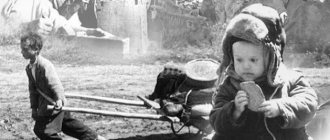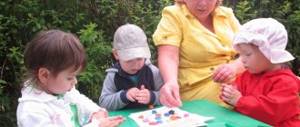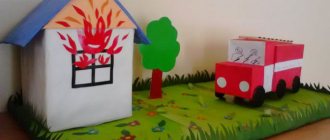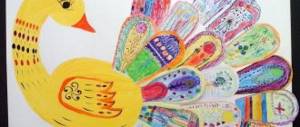Educational games in an after-school group.
Educational games and exercises to activate cognitive processes.
Games that enhance mindfulness in children.
- "We listen to silence." For 3 minutes everyone listens to silence, after which they exchange impressions of what everyone heard.
- "Just a minute." The presenter asks the children to internally measure a time equal to one minute (60 seconds). Everyone raises their hand when the internal minute has passed. The presenter controls using a stopwatch and notes the degree of discrepancy in each answer.
- "What changed?" The exercise is carried out in several versions:
- What has changed in the classroom compared to the previous day?
- what has changed on the table in the position of objects? (Time for consideration is 10 seconds).
- What has changed in our circle? (Children sit in a circle, one person closes his eyes. The leader gives a sign, and two people change places. We need to find changes.)
- "Invisible words." The presenter writes words in the air one letter at a time. Another option: the leader shows cards with letters to the student standing at the board. He must “write” a letter on the board with his finger.
- "Corrector". Children work with texts: they need to cross out a certain letter (for example, “a”) within 5 minutes. After which they exchange texts and check for 5 minutes: a missing letter is considered an error.
- "Line". The leader arranges the children in a line according to certain characteristics:
- according to dew;
- by hair color (from light to dark);
- by the first letter of the last name (first name) - alphabetically;
- by date of birth, etc.
Children are asked to remember their place in various formation options. At the command of the leader, they must find their place in the line.
Classes to develop thinking abilities.
- Come up with words with the given letter:
- starting with the letter "A";
- ending with the letter "T";
- having "CHK" in the middle
- List objects with a given attribute:
- white (green, red) color;
- rectangular (round) shape.
- List words with the meaning “good” and words with the opposite meaning of “solid”.
- "Chain". The first one names a word, the second one names any other word. The third must make a sentence out of them. Then he comes up with his own word. Game option: the presenter names several letters, each of which is the initial letter of the word in the sentence that needs to be composed (for example, n-k-k-t: “There is a book and a notebook on the chair”, “There is a brick pipe on the roof”)
Various entertaining tasks can be used, tasks on intelligence, on “eliminating the superfluous,” on generalizing objects, on continuing a logical series of words and numbers.
Memory training exercises.
- "What's missing?" The presenter reads a series of words (5-7) that are not related to each other in meaning. The second time, not the entire row is read, one word is skipped, the children must restore the missing word (complicating the task - restore the entire row).
- “Once upon a time there was a cat.” Each participant names the definition of the word “Cat” and repeats all those named before it. “Once upon a time there was a handsome, fluffy, smart, cheerful...”, etc. (there may be other options).
- The same principle applies to compiling a story on a given topic: when adding your own sentence, you must first repeat everything that was said before.
Activities to develop imagination
- “What does it look like?” Place a gouache drop on a sheet of paper and fold the sheet in half. What does the resulting paint figure look like?
- “Complete the drawing.” Children are offered outlines of elements of object images, simple geometric shapes, from which they need to draw recognizable pictures.
- “Jump.” Children are invited to jump, but not as usual, but like a sparrow, kangaroo, hare, frog, etc.
- "Merry Choir" Children are invited to act out a well-known song in person or sing it together as a choir of little pigs and puppies.
- "End the fairy tale." You need to come up with your own version of the ending of the entire famous fairy tale (“Kolobok”, “Turnip”, “Teremok”).
Games to develop communication skills
- "Fairytale City" With the help of the teacher, children cut out, glue, paint - “build” a city with unusual houses, “populate” it with residents, and invent the history of this city.
- "Give me a gift." The children stand in a circle, the teacher asks them to come up with what kind of gift they would like to give to the neighbor on the left (probably the teacher needs to stipulate that the gift can be any item: a book, a toy, a flower, etc.). The game takes place in silence. It is necessary, with the help of gestures and expressive movements, without naming the object, to “pass the gift” to the neighbor, who guesses what he was “gifted” to, shows what he will do with it, and then “passes” his “gift”.
- "Artists' Workshop". Children are divided into groups of four, each group agrees on what they will draw. Each student draws his part of the drawing, after which the sheet is rotated 90 degrees, and now it is necessary to complete what was drawn by the previous “artist”. After finishing the drawing, the group comes up with names for it and shows it to everyone.
Games for the development of the sensory sphere of children
- "Talking picture" Children are asked to voice the plot of the picture and guess about the feelings of the people depicted.
- A game using cards “The ABC of Mood” (cards depict people and animals in different moods: sadness, fun, fear, anger, surprise, thoughtfulness).
- "Guess the feelings." Children are invited to show, using facial expressions and gestures, various feelings that others need to guess. Classes under the “School of Polite Sciences” programs have a great effect, when in game situations children learn the use of polite speech patterns and norms of behavior.
Games that promote a positive outlook on life.
To help children with low energy and depression, games that activate a positive perception of life are needed:
- “What I can’t do and what I can do.”
- “What is good in my life and what do I want more?”
- "That I love".
- "Shared story."
All these games do not take a lot of time and effort from the teacher, but bring tangible benefits, helping to create a comfortable atmosphere in the group in which children with communication difficulties will feel free.
GPA daily routine
The school administration, in accordance with the recommendations of sanitary and hygienic services, establishes a daily routine for children attending the extended day group.
The main regime moments are: - Meeting. The teacher gathers the children from the GPD after all lessons have ended. - Lunch according to established standards. — Walk for at least 2 hours. — Self-preparation after 15 hours. For 1st grade students – 1 astronomical hour; 2-3 classes – 1.5 hours; 4-5 grades – 2 hours in total. The advantage of after-school classes is the child’s ability to take spontaneous breaks under the supervision of a teacher. - Afternoon snack. — Interest classes (modeling, appliqué, drawing, board games), visiting additional education clubs, sports sections. Each family independently decides whether the child will attend the GPA: whether it is satisfied with the working conditions of the group, whether the student will be able to prepare lessons in a group, and not in a home environment. It wouldn’t hurt to listen to reviews from other parents whose children attended after-school care. By identifying the child and observing him, you can draw the right conclusions.
Similar
Discussion: 4 comments
- Alexander:
11/16/2016 at 16:21It’s a necessary thing, because I don’t see an alternative!
Answer
- Alexander:
11/21/2016 at 04:03
Extension is great, it’s just a pity that it’s paid
Answer
- Larisa:
01/12/2017 at 10:00
At our school, after-school activities are free. I enrolled my daughter in first grade and is now in fifth grade. I pick her up at about three o’clock in the afternoon, just after lunch, but lunches are paid. The daughter even asks to leave her longer, since at this time she communicates well with her classmates.
Answer
Anna:
10/13/2017 at 19:02
What kind of school is it?
Answer
Outdoor games in an after-school group
Elena Surkova
Outdoor games in an after-school group
The problem of physical inactivity is more relevant than ever in our time. Just a decade ago, children actively walked outside after school, visited swimming pools and sports clubs. Nowadays, the leisure time of many schoolchildren is a computer, which is found in almost every home. Physical inactivity in children is even more dangerous than in many adults, since a growing body requires adequate functioning of the muscles, heart, and blood vessels, and mental activity, intellectual development, and the ability to further learn depend on this. Motor activity is the main component of proper functioning and the key to health; even ancient healers knew the rule “movement is life!”
, but in recent decades most of us have forgotten about this, worrying more about personal comfort.
The after-school group , in which children spend a significant part of their time, in addition to helping schoolchildren with homework, takes on an important function - to create the best possible conditions for the development of students’ personalities.
One of the important tasks in working with children in an extended day group is to ensure that the hours free from completing educational tasks are filled in a reasonable and interesting way.
To a large extent, this depends on the teacher, his ability to captivate children with an interesting activity, give an outlet for their energy, and provide everyone with the opportunity to express themselves most fully and realize their abilities. Play can be of great help to the teacher in this regard.
The teacher must know the games , master the methodology for conducting them, and be able to select them in accordance with the age of the players to achieve certain pedagogical goals. The educational significance of the game and its comprehensive influence on the development of the child can hardly be overestimated. Play is organically inherent in childhood and, with skillful guidance from adults, can work wonders. The game will help the teacher unite the children's team and include all children in active activities. Games instill discipline, children are taught to follow rules, justice, the ability to control their actions, correctly and objectively evaluate the actions of others, and the ability to negotiate. Play for children is an important means of self-expression and a test of strength. In games, the teacher can better get to know his students, their character, habits, organizational skills, creative abilities, which will allow him to find the most correct ways to influence each of them, and, what is also very important, games bring the teacher closer to the children, help to establish relationships with them. closer contact.
There are different games . All of them are necessary and useful for children in their own way, all should be used by the teacher in their work. But outdoor games . As special studies have shown, schoolchildren spend 85% of their waking time in a sitting position, and this has a detrimental effect on their health.
Outdoor games are the best cure for motor “hunger”
— physical inactivity.
Many of them have existed since time immemorial and are passed down from generation to generation. Time makes changes to the plots of some games, filling them with new content that reflects modern life. Games are enriched , improved, many more complicated options are created, but their motor basis remains unchanged. When choosing a game, you must take into account the following circumstances:
-age of the players
- room for games
— outdoor games.
- equipment for games
— number of participants
Teachers of after-school groups have great opportunities to teach children many games, instill a love for them, and ensure that they firmly become part of the life of the children's group . Therefore, knowledge of games is necessary for every educator.





